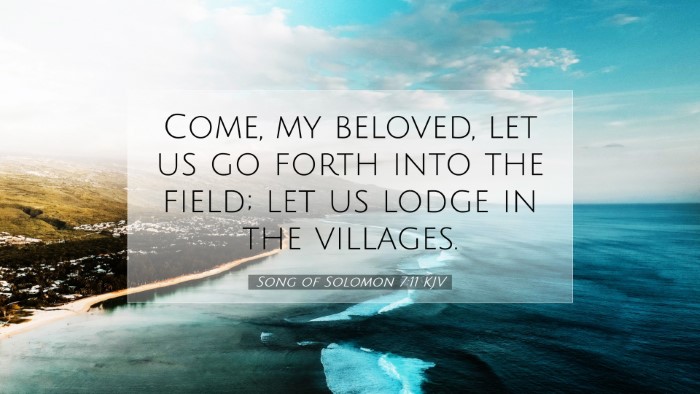Old Testament
Genesis Exodus Leviticus Numbers Deuteronomy Joshua Judges Ruth 1 Samuel 2 Samuel 1 Kings 2 Kings 1 Chronicles 2 Chronicles Ezra Nehemiah Esther Job Psalms Proverbs Ecclesiastes Song of Solomon Isaiah Jeremiah Lamentations Ezekiel Daniel Hosea Joel Amos Obadiah Jonah Micah Nahum Habakkuk Zephaniah Haggai Zechariah MalachiSong of Solomon 7:11
Song of Solomon 7:11 KJV
Come, my beloved, let us go forth into the field; let us lodge in the villages.
Song of Solomon 7:11 Bible Commentary
Commentary on Song of Solomon 7:11
Verse Text: "Come, my beloved, let us go forth into the field; let us lodge in the villages."
Overview
The Song of Solomon, also known as Song of Songs, is a beautiful and poetic celebration of love in its various forms. Chapter 7 continues this rich exploration, portraying intimate relationships and the call for love to be experienced in the beautiful outdoors away from the mundane life. The text suggests an invitation to romance that is both passionate and tender, emphasizing the importance of sharing moments together in nature.
Insights from Commentaries
-
Matthew Henry
Matthew Henry describes this verse as an invitation from the bride to her beloved, signifying a deep longing for companionship that leads to both spiritual and emotional intimacy. He interprets the “fields” and “villages” as metaphors for experiencing love in varied settings, away from societal constraints. Henry emphasizes that love flourishes in simplicity and nature, which reflects the divine beauty of creation.
-
Albert Barnes
Albert Barnes offers a perspective on the social context of the time, noting that the fields symbolize a place of harvest and fruitfulness. He highlights the idea that true love bears fruit and grows when nurtured. Barnes also points out the significance of the 'beloved' being invited to leave the busy city life for a pastoral existence, illustrating the beauty of isolation that allows love to flourish unhindered by distractions.
-
Adam Clarke
Adam Clarke elaborates on the romantic implications of the verse, interpreting the ‘villages’ as places of safety and privacy where lovers can be at peace. He draws attention to the emotional and sensitive nature of the invitation, indicating that the believer is called to find harmony in both love and nature. Clarke suggests that the essence of this verse lies in the desire for earnest communication and the deepening of the relational bond between lovers, depicting that love is meant to be enjoyed in a serene environment.
Thematic Elements
1. Invitation and Response
The invitation in this verse is not just an everyday call; it suggests a profound longing to escape the ordinary and seek special moments together. This element of the text can be a model for spiritual intimacy with God, inviting believers to step into deeper communion.
2. The Symbolism of Nature
Nature plays a significant role in expressing the sentiments of love. The fields can symbolize abundance and growth, while the villages represent security and community. Together, they paint a picture of a love that is both intimate and expanding, reinforcing the idea that God’s love and creation are intertwined.
3. The Balance of Action and Rest
The call to “go forth” indicates action, while “lodge in the villages” suggests a time of rest and reflection. This balance highlights the different phases of a loving relationship and invites believers to understand that movement and stillness can coexist in their spiritual and romantic journeys.
Conclusion
The intricate beauty of Song of Solomon 7:11 invites readers to reflect on the nature of love, both human and divine. It challenges individuals to seek experiences that nurture relationships in environments where they can grow and thrive. This verse serves as a reminder of the important balance between moving forward in love and taking time to rest and cherish each moment together. For pastors, students, theologians, and Bible scholars, it underscores the need for intentionality and creativity in loving relationships—highlighting that true love connects deeply with the world God created.


